Groaning Noise When Braking At Low Speed (less than 30 mph): 10 Causes
Sticky caliper pins that need lubrication is the most common cause of groaning noise when braking at low speeds. Other causes of groaning or squealing noise when braking include worn brake pads, spongy pedal, damaged wheel bearing, and warped rotor. At low speeds, brake pad material binds with the rotor. Uneven brake pad wear can also cause groaning. If the noise comes from the rear, check the drum brakes. Also, loose lug nuts of wheel can make the brake drums detached from the brake shoes, causing groaning noise. Misaligned wheels make the rotor off-true, causing the pads to connect and disconnect when braking slowly, resulting in squealing or groaning sound.
The brakes make an annoying groaning noise when you brake gently at low speeds. This sound means the brake pads are getting thin.
The noise is not dangerous yet. But it says you need to pay attention. In this guide, we look at why brakes groan. And how to fix the issue before it gets worse.
Note: If you have recently replaced brake pads and discs, it is important to perform a brake bedding procedure to break in the pads.
I’ve put together an interactive tool for you to help with car problem diagnosis. It leads you through simple steps. Don’t miss to check it.
Bonus Read: You can also read my guide on groaning noise when reversing.
- Sticky brake caliper pins are a common cause of groaning noises when braking at low speeds. Lubricating the pins can help resolve this.
- Loose lug nuts on the wheels can lead to wobbling and groaning noises during braking. Properly torquing the lug nuts is important.
- New brake pads and rotors need to be bedded in properly initially to avoid groaning. This involves carefully wearing them in.
- Contaminated or low brake fluid can cause a spongy brake pedal resulting in groaning noises. Flushing and bleeding the system can help.
- Aftermarket brake pads that don’t fit properly can wear unevenly and cause annoying groaning noises. Using OEM specs is best.
What is My Personal Experience With Groaning Sound When Braking?
Once, my Toyota started making a bad groaning noise when braking slow. I lifted the car up and held the wheels. I felt some wiggle. The lug nuts were loose. I tightened them good with a torque wrench in a star shape. The groaning was gone. Keeping lug nuts tight is so important. Now I check them myself every couple of months.
What are the Causes of Groaning Noise When Braking Slowly?
Here are the causes of the low-speed brake groaning sound:
1. Sticking Caliper Pins
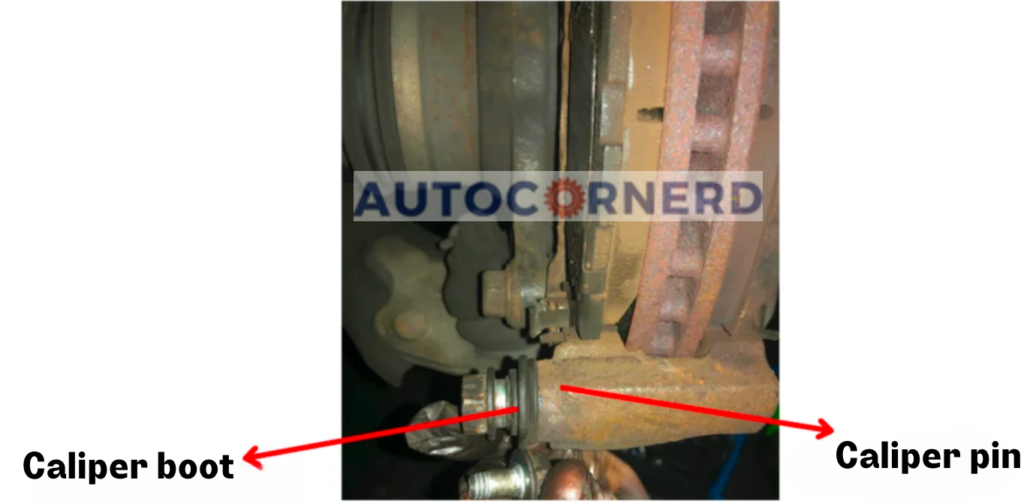
The caliper pin is a round metal rod. It connects the brake caliper to the brake pad and piston. The caliper pin guides the angle of the brake pad. This helps the brake pad press firmly against the brake disc when braking.
When you press the brake pedal, brake fluid pushes the piston. The piston presses the pads against the rotor. This makes the caliper slide along the pin. As a result, the other pad presses the disc too.
To understand the caliper pin’s purpose, please watch this short video:
If the caliper pin gets stuck, the brake pad can’t touch the disc right. This causes a grinding noise when braking slowly. The brake pad isn’t pressing the disc firmly. The uneven contact makes the noise.
How to spot sticky caliper pins?
If one brake caliper is sticking, it will feel hotter than the calipers on the other wheels.
Stuck brake caliper guide pins can really cause problems. Most times, rust from water and salt is what makes the pins stick.
But don’t forget dirt and debris that can build up around the pins. This can also make them stick. Of course, not having enough grease can cause the pins to stick too.
The caliper guide pins have a rubber boot behind them. The rubber boot holds grease that keeps the pins sliding smoothly.
How to fix sticky caliper pins?
Clean the brake caliper pins with a wire brush to remove dust, debris, and signs of rust. Once the caliper pins have been cleaned, apply a thin layer of lubricant to them. This will help ensure that the pins move freely and prevent them from sticking.
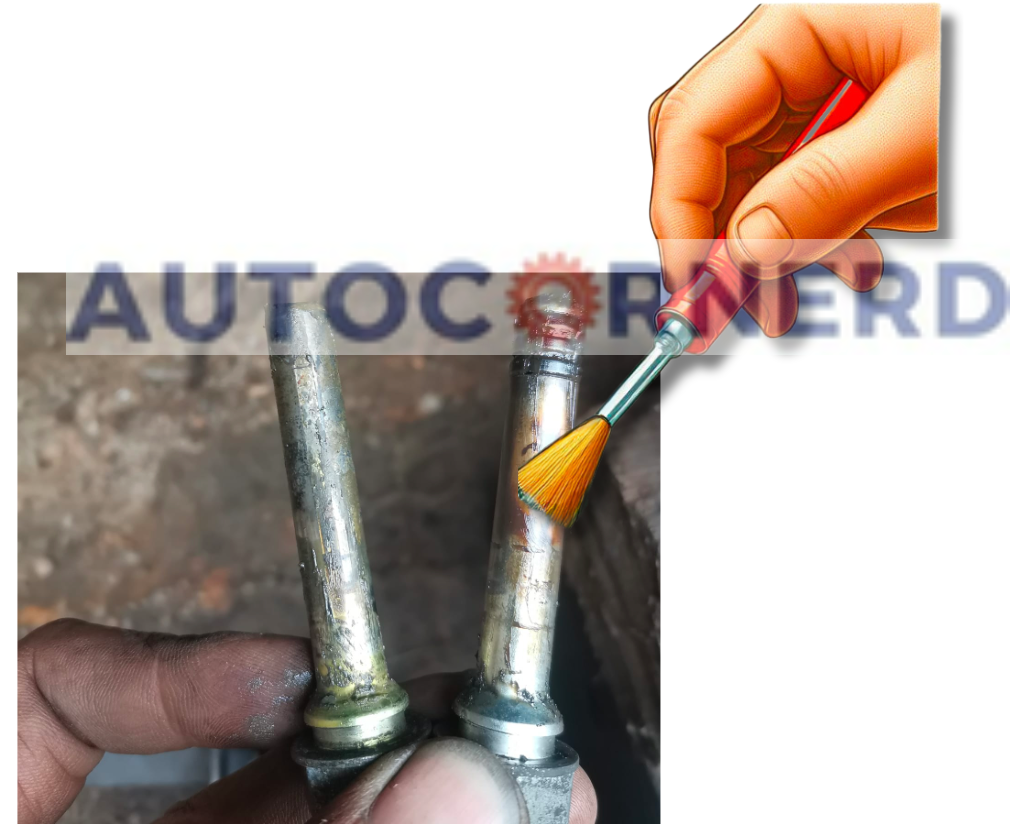
Note: Always use recommended silicone paste to lubricate the caliper pins. Furthermore, if too much lubricant is applied to the slide pins, air can be trapped at the end of the pin creating an “air spring”. This condition causes the caliper/pad assembly to drag on the rotor.
If you are hearing groaning noise from brakes in the morning, make sure to read my guide on that topic.
2. Wheel Is Not Tightened Properly
If you’ve recently got installed brake pads, the lug nuts on the wheels may not be tight. This can make the vehicle groan when braking slow.
When the wheel is loose, there can be problems. When braking, the wheel can wiggle side to side. This makes an ugly groaning noise. The loose wheel can wear the brake pads fast. That means big repair bills.
How to check if the wheel is loose?
If you hear a weird groan when braking slow, check the wheel nuts. Make sure they are tight enough with a torque wrench. If not, tighten to what the maker says.
Also, tighten the lug nuts in a star pattern. If not, the wheel goes out of balance. Then the brake disc can warp. That also causes the groaning noise.
If wheels are not tightened properly, steering wheel may also turn automatically.
3. Damaged Wheel Bearing
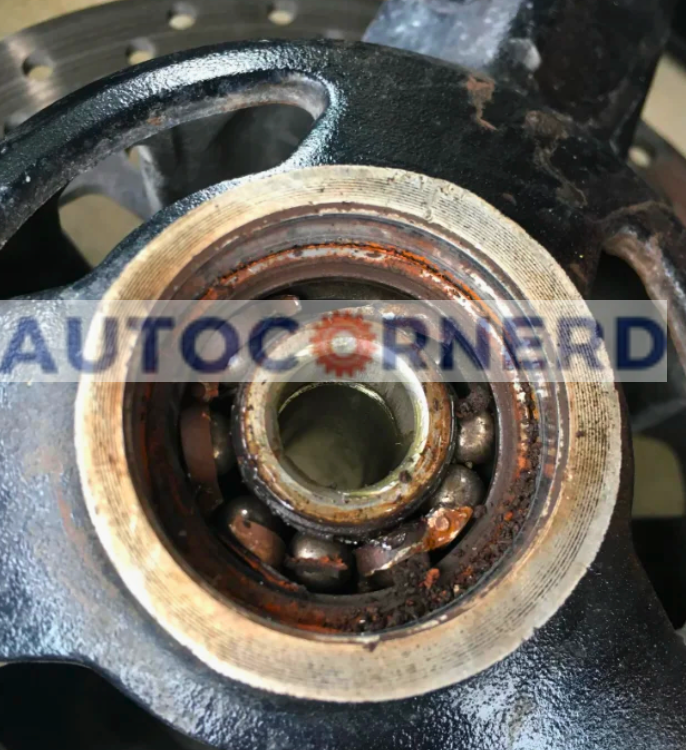
The wheel bearings let the wheels spin freely. They are at the wheel hub and give the needed support for the wheel and axle.
But over time, the wheel bearings can get damaged and worn. One problem this causes is an annoying groaning noise when you apply the brakes at slow speed.
Rust can make little pits on the bearing surface. That lowers how well it works and makes it wear out faster.
Also, if a vehicle is overloaded, it puts extra strain on the wheel bearing. So it wears out quicker.
How to check a bad wheel bearing?
Lift up the vehicle and hold the top and bottom of the wheel. Shake it hard. Next hold the left and right and shake it. If there’s some play, either the wheel nuts are loose or there’s play in the bearings.
4. Brake Rotor and Pads Are Not Bedded Properly
When you install new brake rotors and pads (make sure they are OEM), it is normal that for some days brakes will groan at low speeds.
This is because brake pad material binds up a little with the brake rotor when it is new. New brake rotors are glazed and do not grab well with the brake pads, due to which your vehicle produces groaning noise when braking slowly.
Bedding is a process by which the brake rotors and pads are worn in to create a more uniform friction surface, which helps them to work together more efficiently. In this way, brake pads and rotors can work together to provide a smooth, quiet brake experience.
When the brake rotors and pads are not bedded, the friction surface may not be uniform, which can cause uneven braking performance. This can lead to excessive brake noise, vibration, and, in extreme cases, brake failure.
How top properly bed in new brake pads and rotor to avoid groaning noise?
To bed your brake rotors and pads, you’ll need to engage the brakes several times in a row. Bedding in brakes should be done on a flat, straight stretch of road. Doing so on a curved or hilly road could cause the vehicle to skid or slide.
To bed the brakes, you will need to lightly press on the brakes at a low speed and then come to a complete stop. This process should be repeated several times, increasing speed each time. After a few cycles, you will begin to feel the brakes become smoother and quieter.
So, drive the vehicle at a speed of 60mph and slow it down to 5mph speed with fairly heavy braking without coming to stop.
This will raise the temperature of brake components sufficient for the bedding of brakes. Make sure that you do not press the brakes too hard as it will activate ABS. Repeat this process 10 times.
5. Warped Brake Disc
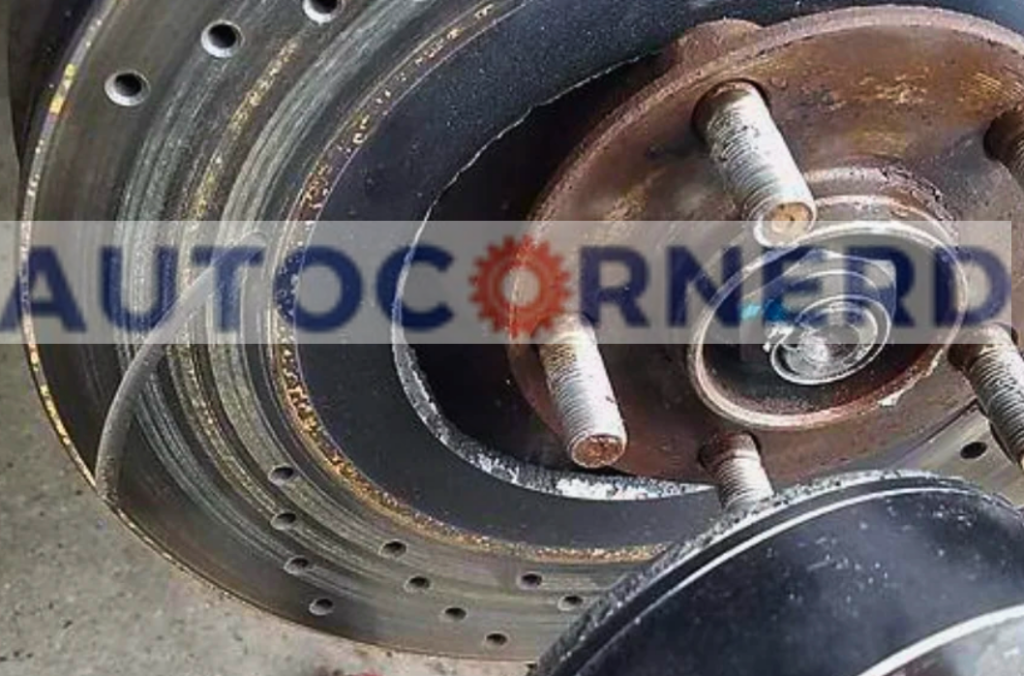
The groaning sound you hear when braking slowly can mean the brake discs are warped.
Warped brake discs are a big problem. They make the brakes not work right. The brakes get less efficient. Warped brake discs can even be unsafe.
When the brake disc is moving slowly, it can’t overcome the resistive forces caused by its uneven wear.
The main reason brake discs get warped is scoring. This happens when the brake pads get too worn or dirty.
Dirt and bits get on the brake rotor. They make grooves in the rotor. Then the rotor gets bent or warped.
Rust also warps the brake rotors. Rust forms when salt, water or chemicals touch the brake disc. If not fixed, the rust damages the brake rotor structure. This makes the groan when braking.
Glazed brake pads can also warp brake discs. Brake pads wear down over time. But if brake pads get too hot, they harden and form a glazed surface. This glazed surface results in the warping of the brake rotor. This will cause a groaning noise when braking.
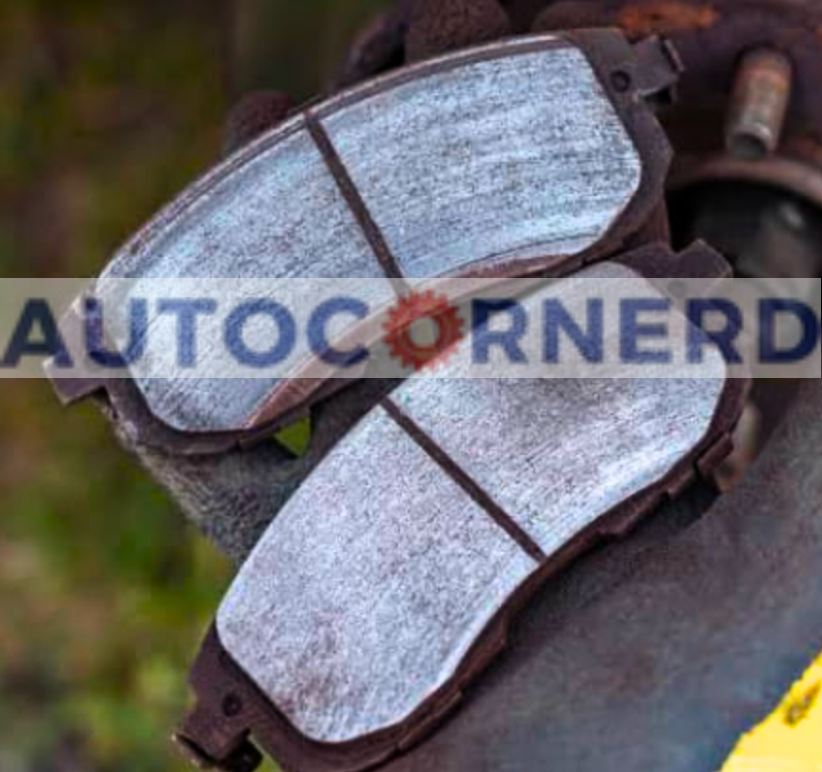
How to fix a warped or corroded brake disc to avoid groaning noise?
If brake discs are just corroded, use a wire brush to remove dirt and corrosion. Then use CRC brake cleaner to clean the brake discs. You can also use Isopropyl Alcohol to clean brake discs.
6. Spongy Brake Pedal Or Bad Brake Fluid
A spongy brake pedal can lead to a disconcerting groan when braking at lower speeds. This is often caused by inadequate pressure in the brake lines, which prevents the brakes from working properly.
This can present itself in a more subdued brake pedal than usual and a groaning sound when applying the brakes.
If the brake fluid is contaminated or its level is low, the pressure in the brake lines can drop and air can be drawn into the system. This creates a spongy sensation in the brake pedal.
How to diagnose spongy brake pads?
The step in diagnosing this issue is to check the level of brake fluid in the master cylinder and the brake fluid reservoir. If the brake fluid level is low, then you need to top it up with the correct brake fluid and bleed the brakes.
This will remove any air in the system and restore the pressure, allowing the brakes to work normally again.
In the below Youtube video, you can learn how to bleed your brakes by yourself:
7. Worn-out Brake Pads
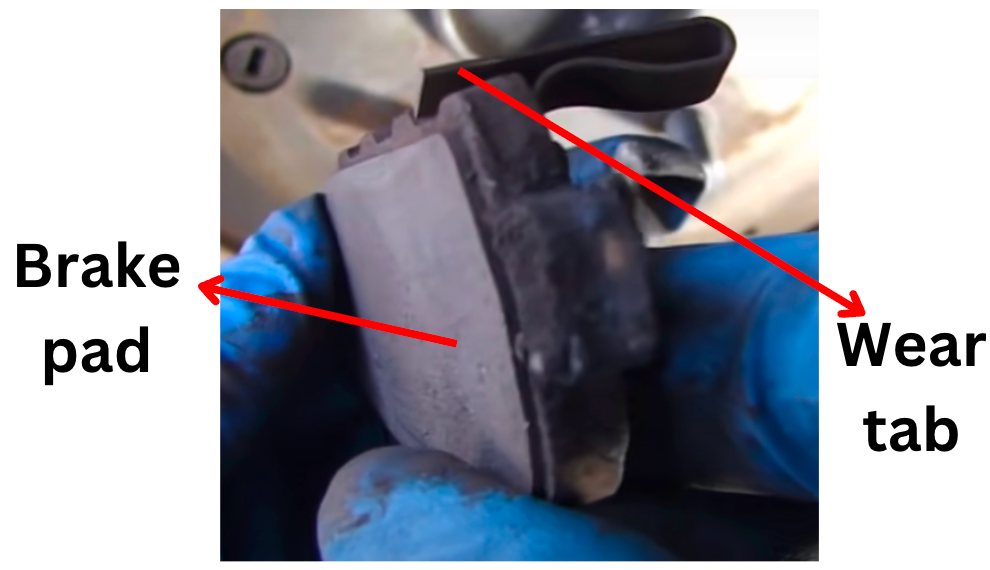
The brake pads have three parts. There is a metal plate, a friction pad, and a wear indicator.
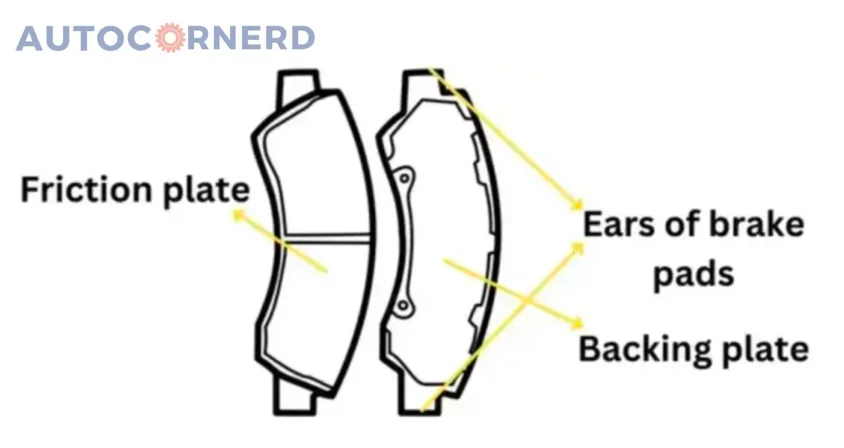
The metal plate keeps the friction pad attached to the brake. The friction pad makes the friction to stop your car.
Over time, the friction pad gets thin and worn out. This creates less friction on the brake rotor. Your brakes get weaker and can’t stop the car as fast. This may cause a groaning noise when you brake slowly.
How to know a bad brake pad?
Use a glove and feel the pad. See if it feels bumpy or very gritty. If yes, use high grit sandpaper (200-300 grit) to scrub the bumps. This removes stuff stuck in the pad.
If you are hearing grinding noise when braking but your brake pads seem fine, the chances are that wear indicator is touching brake disc.
8. Improper Size and Specs of Aftermarket Brake Pads
The noise from braking when slowing down often comes from aftermarket brake pads. These brake pads are different sizes than the factory ones. So they wear unevenly.
The size of the brake pads really affects stopping power. Too small brake pads limit contact with the rotor. So braking doesn’t work as well.
If brake pads are too big, they may not fit properly in the brake caliper, leading to reduced braking efficiency.
Also, wrong-sized pads can cause issues. They might not line up with the rotor. The chamfering can wear off fast. And the brake pad might rock back and forth in the caliper.
When picking the brake pad size, check the maker’s specs. That shows the right size for the vehicle. It helps get the brake pads that fit best.
9. Brake Pads Are Vibrating Due to Lack Of Grease
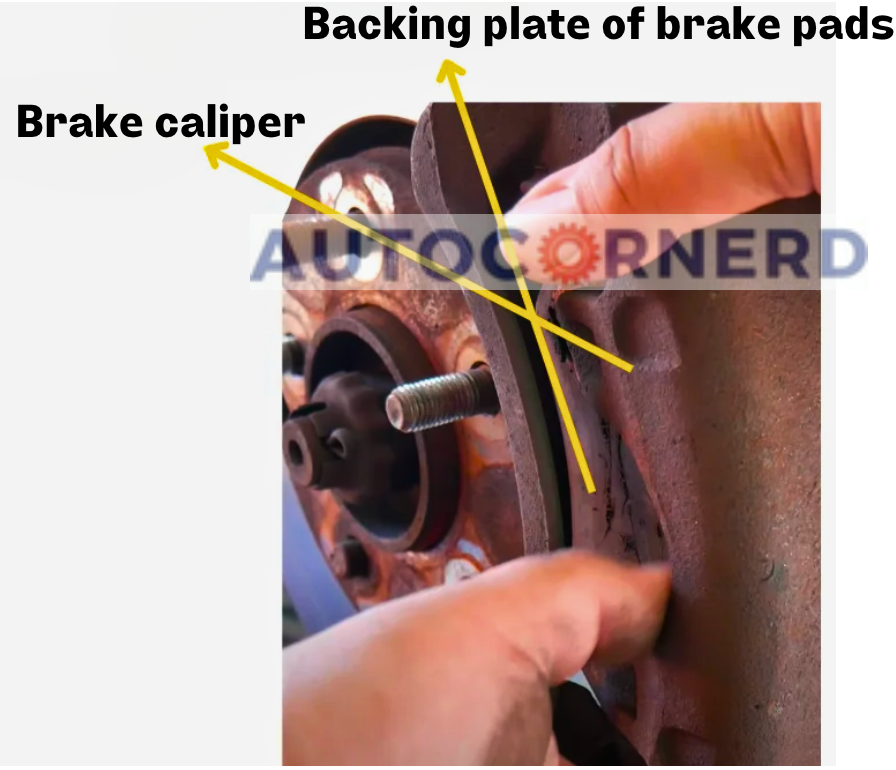
The brake pads cannot work properly without having the right lubrication where the brake pads touch other surfaces.
This is very important for the three spots where the brake pads make contact: the front and back edges of the pads, and the backing plates.
If these contact points don’t have enough lubrication, the brake pads will shake or vibrate when braking. This happens because the brake pads can’t slide back and forth smoothly on the retaining clips of the mounting bracket without lubrication. This will produce a slow brake groaning sound.
How to fix shaking brake pads?
To fix this, lubricate the contact points of the brake pads using high-temp brake grease or an anti-seize compound.
This helps lower friction and wear when braking. It also reduces vibrations so the brake pads can slide smoothly on the retaining clips of the mounting bracket.
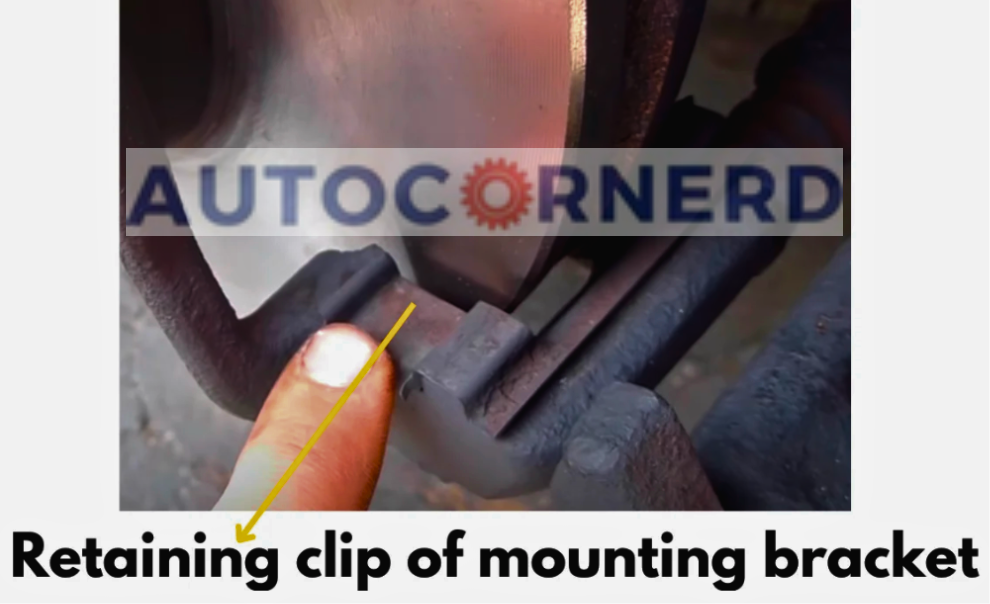
I recommend using ATE Plastilube Grease. Apply it to the ears of the brake pads and backing plate. This prevents rust from returning and binding the pads.
Also put grease where the backing plate of the brake pad touches the brake caliper. Don’t apply grease to the friction plate of the brake pad. That will ruin the material and the brake rotor.
10. Damaged Upper and Lower Control Arm Bushings
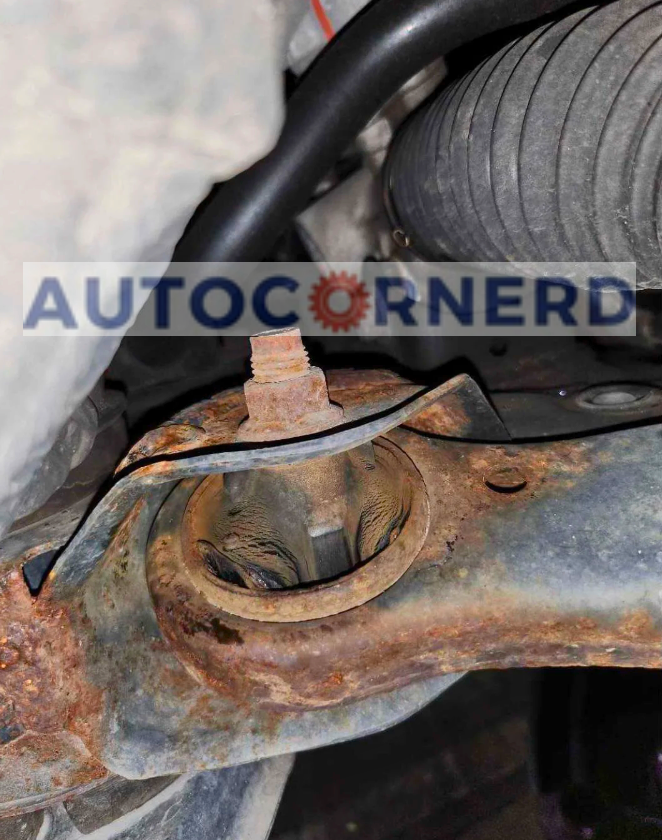
Control arms are an important part of your vehicle’s suspension system. They connect the suspension and vehicle’s chassis together. Control arms have upper and lower bushings. The bushings are made of rubber. They fit between the control arms and the frame.’ together. Control arms have upper and lower bushings. The bushings are made of rubber. They fit between the control arms and the frame.
The bushings act like a cushion. They absorb vibration. This lets the control arm and chassis move smoothly. Good bushings are needed for:
- Keeping the parts in place
- Smooth suspension movement
- Less noise when driving
If the bushings get worn or damaged, the suspension can move too much. This extra movement can make a groaning noise. You may hear it when just driving. Or when turning slowly.
How to spot bad control arm bushings?
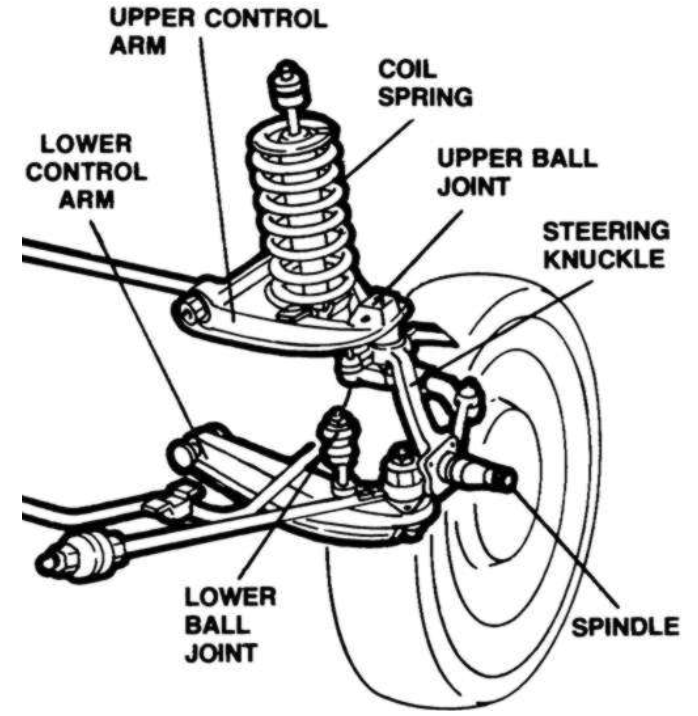
Control arms connect the steering wheel to the vehicle’s chassis via steering knuckle. If the control arm bushings are damaged, the steering may become loose and difficult to control due to the suspension being out of alignment.
What Steps Should I Take to fix Groaning Noise from Slow Braking?
Start by cleaning the caliper pins thoroughly with a wire brush to remove any dirt, corrosion or debris. Then apply high temperature brake lubricant such as brake caliper grease to the pins to prevent them from sticking. Make sure not to over lubricate.
Next, check if the wheels are tightened to the proper torque specifications with a torque wrench. Improperly torqued lug nuts can lead to loose wheels and brake components, resulting in groaning noises. Tighten lug nuts in a star or crisscross pattern.
Inspect the brake rotors and pads. If new, perform proper bedding procedures by engaging the brakes 20 TO 30 times from 60mph to 5mph without fully stopping. This helps transfer material to provide smoother braking. Glazed, worn or damaged pads/rotors can cause groaning noises and need replacement.
Low brake fluid levels or contamination leads to a spongy pedal and air in the lines. Check levels and change fluid if needed. Bleed the system to remove any air. This restores proper pressure for smooth braking.
Aftermarket brake pads are often an improper fit, causing uneven wear and groaning. Consult manufacturer specs and use OEM pads when possible for proper fitment. Lubricating pad abutments, clips and caliper contact points will reduce pad vibration and chatter.
Finally, worn control arm bushings are a common source of groaning and suspension noises. Visually inspect for cracking, splitting or excessive play. Damaged bushings need replacement to realign components and provide proper chassis movement.
Is There A Way That I Can Prevent Groaning Noise When Braking Issue?
The number one way to prevent any noise in your vehicle is the timely maintenance and inspection of your vehicle. Regular maintenance and inspections can help catch small issues before they become loud problems, saving you money and keeping your vehicle running smoothly.
Autocornerd team has made a tool for vehicle maintenance schedule lookup. So, be sure to check that out. Moreover, experts at Autocornerd have also designed a detailed checklist for vehicle inspection. You can shop here.
Some First Hand Experiences Shared By Users In Different Communities
Our team conducted research across various online communities, forums, and subreddits to gather user comments and opinions on “groaning noises when applying brakes slowly”.
User 1 says:
Just last week, my 2018 Honda Accord started making this groaning noise whenever I brake at low speeds. Initially, I thought it was just a minor issue, but it got louder. Took it to the mechanic, and they found out the brake pads were worn unevenly. Replaced them, and the noise disappeared.
User 2 says:
My Audi A4 had a similar problem. The groaning noise was actually due to a faulty ABS module. It was an expensive fix, but it took care of the noise.
User 3 says:
My Chevrolet Silverado started making this groaning noise when I braked at low speeds. I thought it was a major issue, but it was actually just a loose brake caliper bolt. Tightened it up and the noise was gone.
User 4 says:
Noticed a groaning noise when braking in my Toyota Prius. It was confusing since it’s a hybrid. Turns out the brake pads were glazed due to infrequent use. Had them replaced and the noise stopped.
User 5 says:
My Mazda CX-5 started that low-speed groaning noise. I was clueless at first, but a quick forum search suggested checking the brake calipers. Sure enough, one of the calipers was sticking. Fixed that, and the problem was solved.
